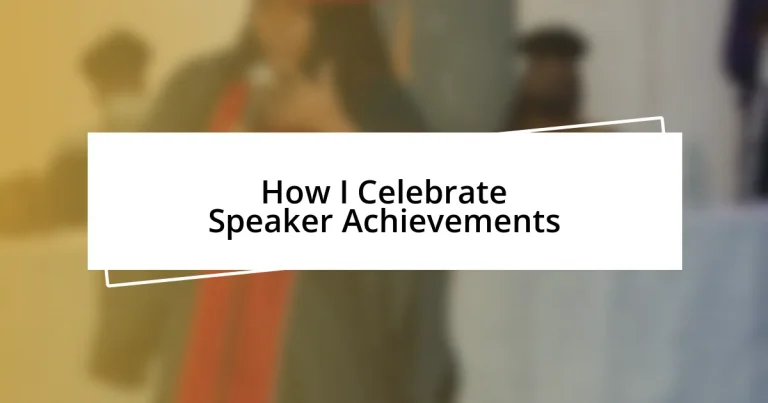Key takeaways:
- Understanding speaker achievements involves recognizing personal growth, resilience, and the ability to inspire others, rather than just awards.
- Celebrating milestones fosters community and encourages continuous improvement through audience engagement and recognition rituals.
- Incorporating personal touches and documenting success enhances the emotional connection and significance of celebrations.
- Reflecting on future goals is crucial for growth, creating a purposeful roadmap towards continued achievement and motivation.
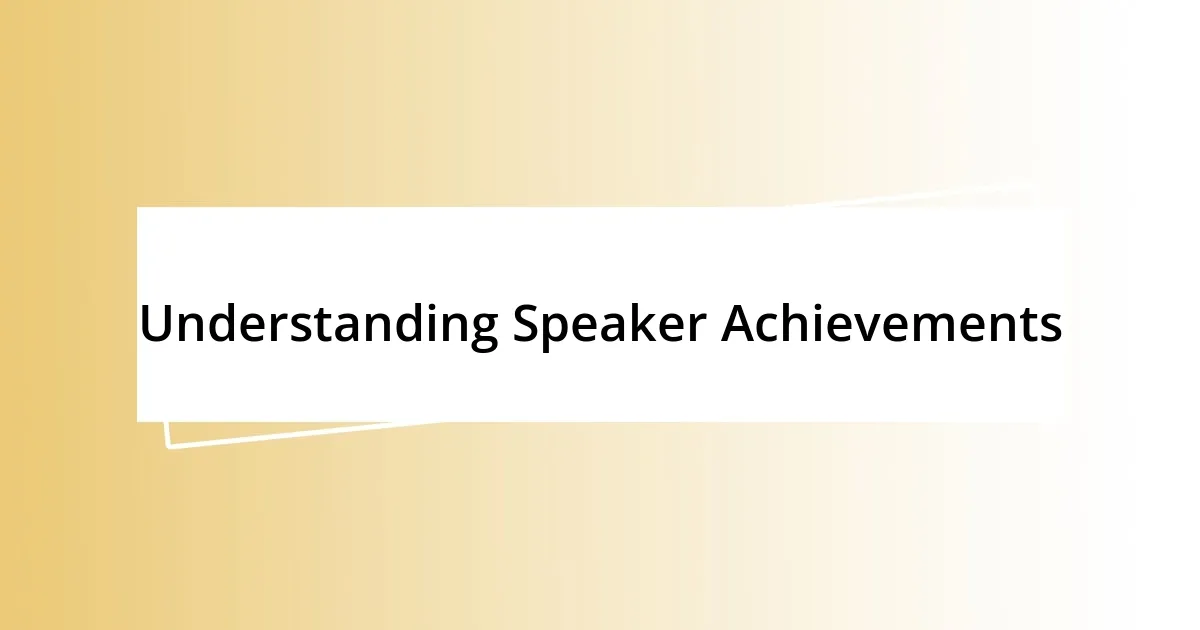
Understanding Speaker Achievements
Understanding speaker achievements goes beyond just recognizing awards and accolades; it’s about appreciating the impact of their contributions. I remember attending a conference where a speaker shared their journey of overcoming obstacles, which resonated with me deeply. It made me realize that achievements are often a culmination of personal growth, resilience, and the ability to inspire others.
Another aspect to consider is how achievements vary across different contexts and audiences. For some speakers, gaining recognition may come from their expertise in a niche subject, while for others, it’s about their ability to connect emotionally with their audience. Have you ever felt that rush when a speaker captivates you? That’s a tangible achievement, showcasing their skill in transforming complex ideas into relatable narratives.
Moreover, achievements can serve as a benchmark for personal and professional growth. I once noted how a colleague went from being nervous to confidently commanding the stage after several speaking engagements. This transformation illustrates that achievements aren’t just milestones but rather stepping stones toward greater self-awareness and confidence. Don’t you think every speaker’s journey is an inspiring story waiting to be told?
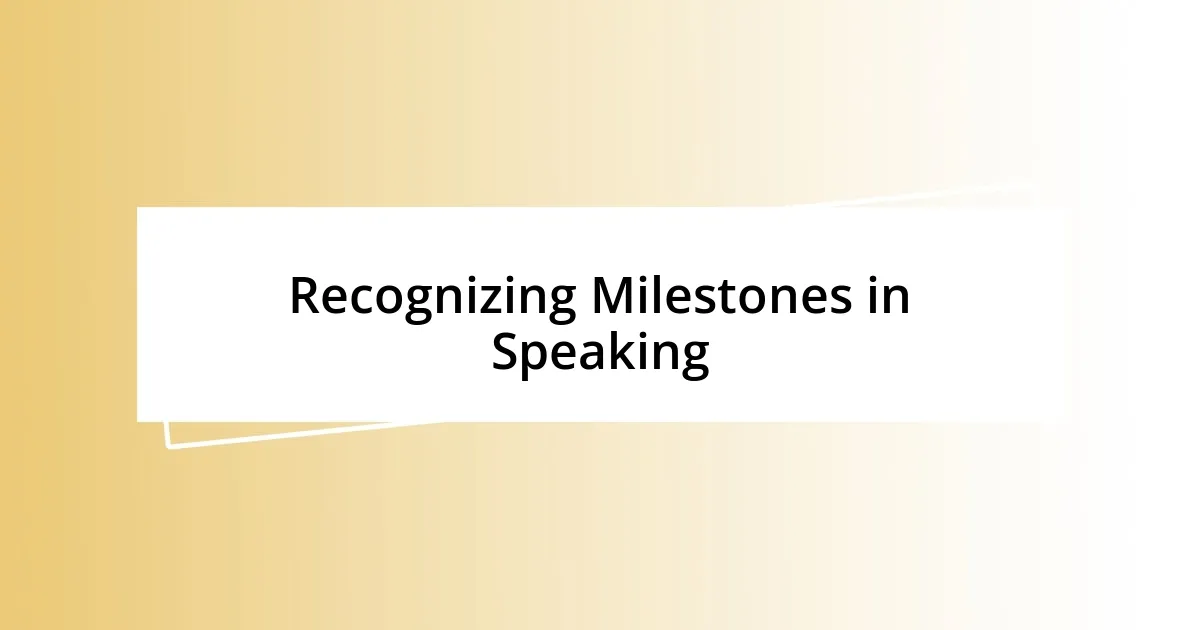
Recognizing Milestones in Speaking
Recognizing milestones in speaking is crucial for both the speaker and their audience. I recall the first time I received feedback from a workshop I led; a participant mentioned that my insights had shifted her perspective on public speaking. Moments like these remind us how milestones are not just markers of success, but also reflections of the connections we create. I think celebrating these key moments can foster a sense of community and belonging among speakers and their audiences.
As I reflect on significant milestones, I remember a time when my friend was awarded “Speaker of the Year.” It wasn’t just the trophy that stood out; it was the heartfelt messages from attendees who shared how her presentation impacted their lives. This taught me that achievements can ripple outward, inspiring change far beyond the stage. Each moment of recognition serves as an encouragement, reminding us all of the positive effects our words can inspire.
In my experience, acknowledging milestones also encourages continuous improvement. I once set personal goals based on key feedback from past events, and this helped me refine my approach to speaking. By celebrating milestone achievements like these, speakers can chart their growth, embrace challenges, and aim for higher levels of excellence. How do you celebrate these pivotal moments in your speaking journey?
| Type of Milestone | Example |
|---|---|
| Feedback Recognition | Audience member sharing personal transformation |
| Award Recognition | Receiving “Speaker of the Year” |
| Personal Growth | Setting and achieving personal speaking goals |
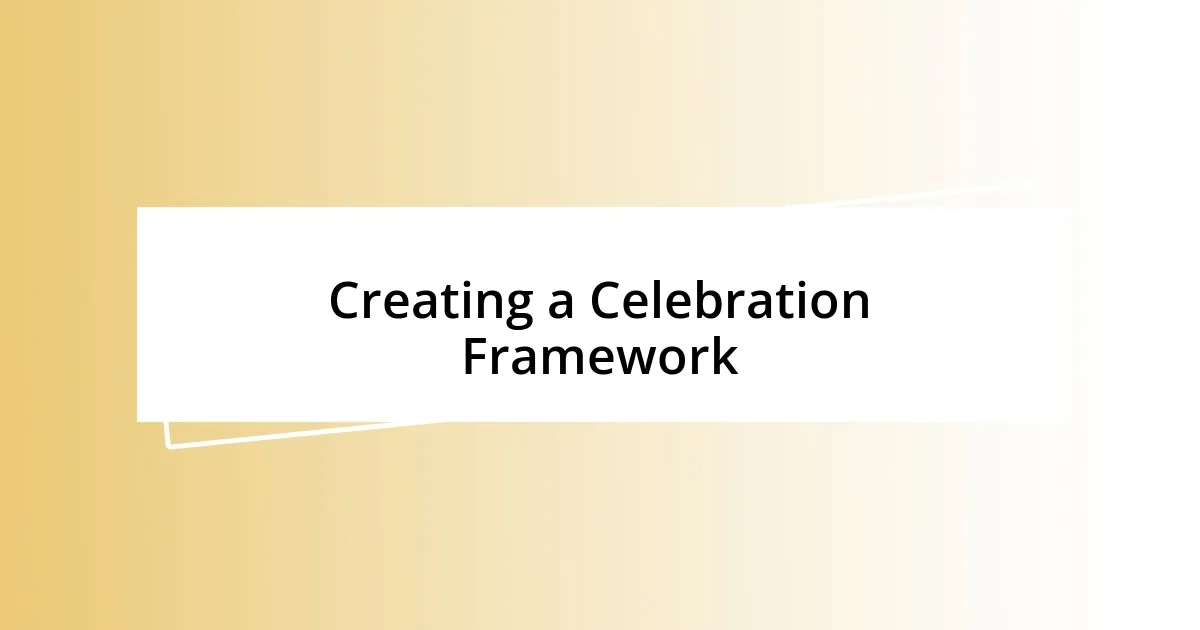
Creating a Celebration Framework
Creating a celebration framework involves identifying the key elements that resonate with both the speaker and their audience. To make these celebrations impactful, I recommend focusing on personal stories and shared experiences. I once organized a small gathering for a colleague who landed their first major speaking gig. We reflected on their journey, celebrating not just the achievement but also the dedication that led to it. It reminded me that every step should be acknowledged, creating a sense of belonging and respect.
To structure your celebration framework, consider these components:
- Personal Reflection: Encourage speakers to share their journey and insights.
- Audience Engagement: Involve attendees in the celebration through sharing their own experiences related to the speaker’s message.
- Recognition Rituals: Develop traditions that signify appreciation, such as personalized awards or testimonials.
- Feedback Sharing: Highlight transformative moments from audience feedback.
- Future Goals: Celebrate not just what has been achieved, but what’s next in the speaker’s journey.
By thoughtfully incorporating these elements, the celebratory experience can become a powerful tool for connection and motivation.
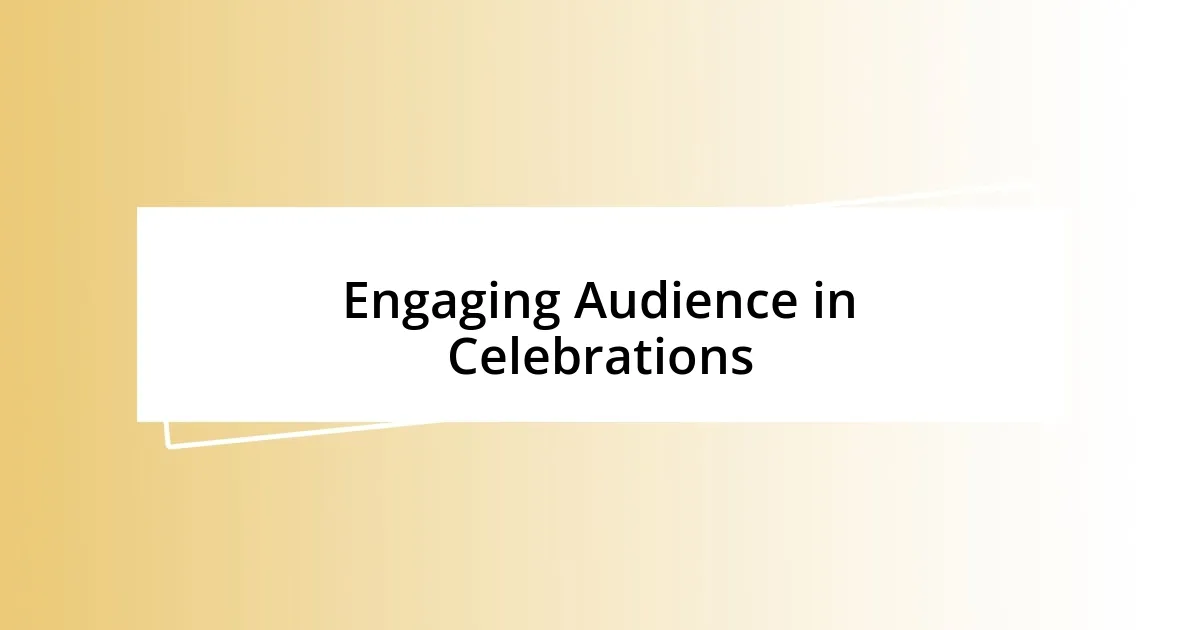
Engaging Audience in Celebrations
Engaging the audience during celebrations can be a transformative experience for both the speaker and those present. I remember hosting an event where we invited audience members to share their own stories of transformation related to my presentations. The emotional exchange not only deepened the connection but also created a ripple effect, illustrating how shared experiences can help us all feel valued and understood. Have you ever felt that sense of belonging when hearing someone else’s journey?
Another way to engage the audience is through interactive recognition rituals. I once participated in a celebration where attendees were encouraged to write down and share how a speaker had influenced their own lives. This participatory approach not only celebrated the speaker’s achievements but also highlighted the community aspect of their work. Watching the joy on the speaker’s face as they heard these personal testimonials was truly heartwarming.
In my experience, incorporating future aspirations into the celebrations can captivate the audience even more. When I was recognized for a speaking achievement, my mentor invited everyone to share their goals for future speaking engagements. This created an atmosphere of hope and ambition, reminding us all that while it’s important to celebrate accomplishments, it’s equally vital to look forward to what’s next. How do you incorporate your audience’s aspirations into your celebrations?
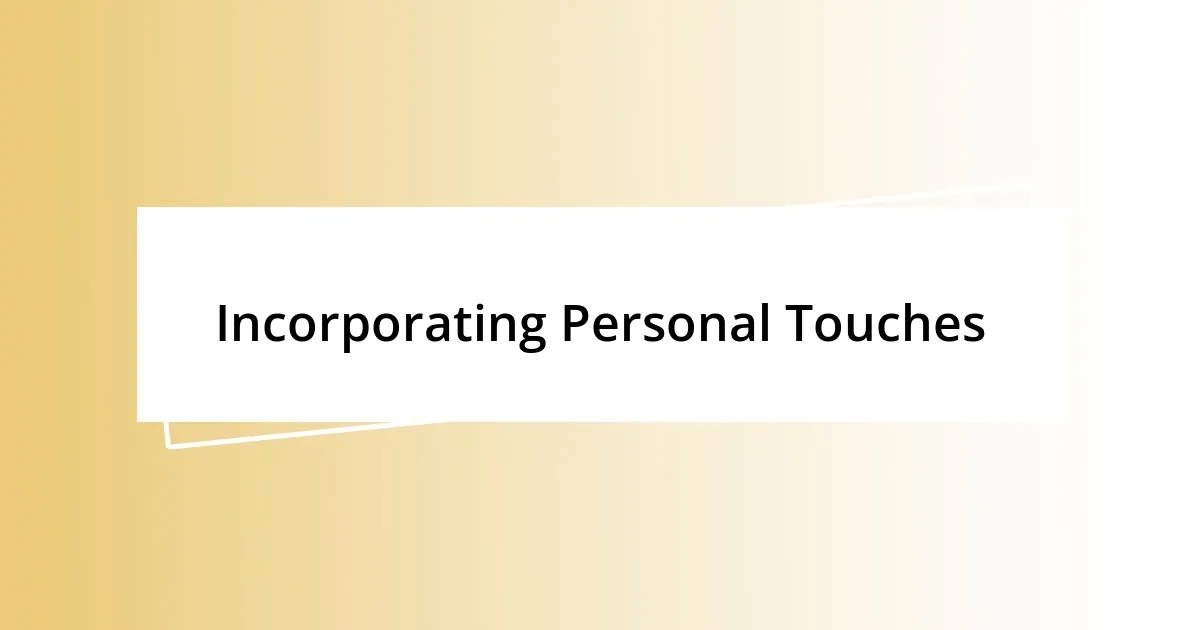
Incorporating Personal Touches
Incorporating personal touches into celebrations can evoke powerful emotions that resonate deeply with everyone involved. I once tailored a recognition event where each guest shared a short story about how the speaker’s insights impacted their lives. This not only created a warm atmosphere but also highlighted the real, tangible effects of the speaker’s work. It reminded me that personal anecdotes can truly amplify the meaning behind achievements. Have you ever left an event feeling inspired by someone else’s story?
Another effective way to personalize celebrations is by embedding heartfelt tokens of appreciation. For example, I once surprised a mentor by creating a scrapbook filled with messages from those they influenced. Each page contained reflections from colleagues and mentees, showcasing the widespread impact of their dedication. The joy and surprise on their face told me that these gestures are more than just keepsakes; they’re reminders of the connections we’ve built and the lives we’ve touched together. Isn’t it incredible how simple expressions of gratitude can lift someone’s spirit?
Ultimately, I believe that personal touches give celebrations a lasting significance. During a celebration for a friend’s milestone, I organized a themed giveaway that tied into their journey—a collection of books and resources that inspired their path. As they opened each gift, their eyes sparkled with nostalgia and appreciation, demonstrating how thoughtful gestures can echo through time. Reflecting on personal experiences not only enriches the event but also creates cherished memories that linger long after the applause fades. Don’t you think these elements are what truly make a celebration special?
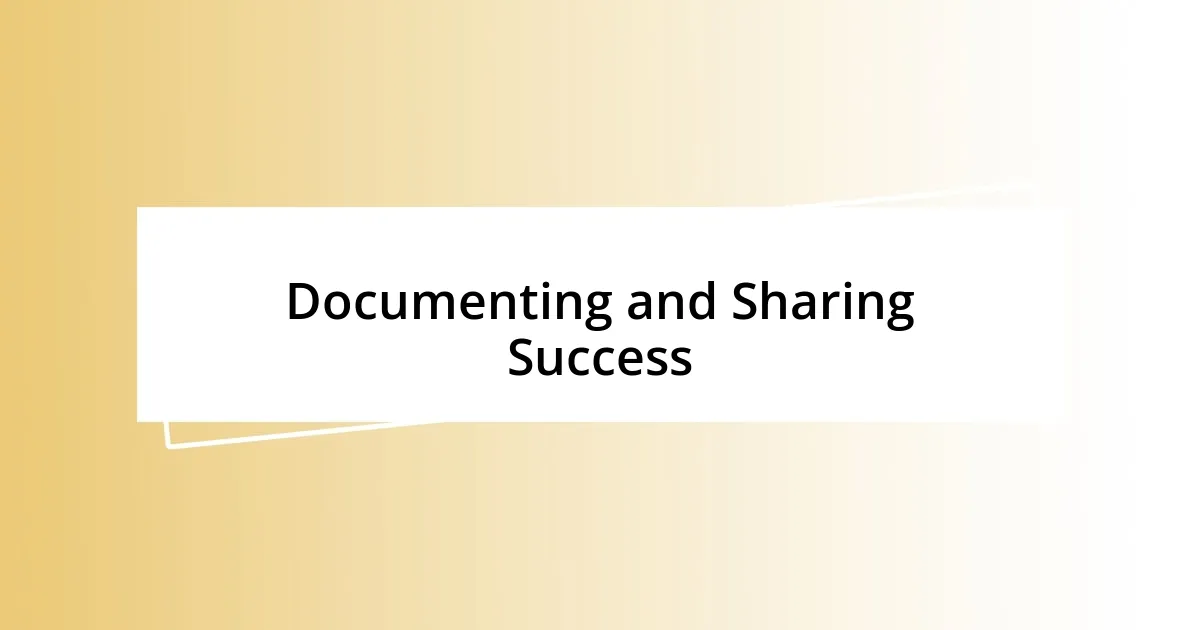
Documenting and Sharing Success
Documenting and sharing success is an essential part of celebrating achievements. I remember when a colleague of mine received a prestigious award; we decided to create a video montage showcasing her journey. Seeing her growth and the pivotal moments highlighted in that video not only celebrated her success but also inspired others to pursue their own paths with vigor. Have you ever watched a compilation of someone’s milestones and felt motivated to reflect on your own journey?
When it comes to sharing wins, visuals play a powerful role. Once, I initiated a social media campaign highlighting various speakers and their contributions to our community. Each post featured a compelling photo and a brief story about their impact. The positive reactions we received—stories from others who were touched by these speakers—created a vibrant community narrative that celebrated growth and achievement. Isn’t it rewarding to witness how shared success stories can forge stronger connections among people?
Additionally, I find that written reflections, like blogs or newsletters, can serve as a great platform for documenting achievements. I penned down my thoughts after a speaking event where I was able to engage with a diverse audience. In it, I detailed not just my accomplishments but also the lessons learned from the experience. Sharing these insights provided others with a glimpse of my journey, fostering a sense of unity as we navigated our individual paths. Have you considered how your written reflections might encourage others on their own journeys?
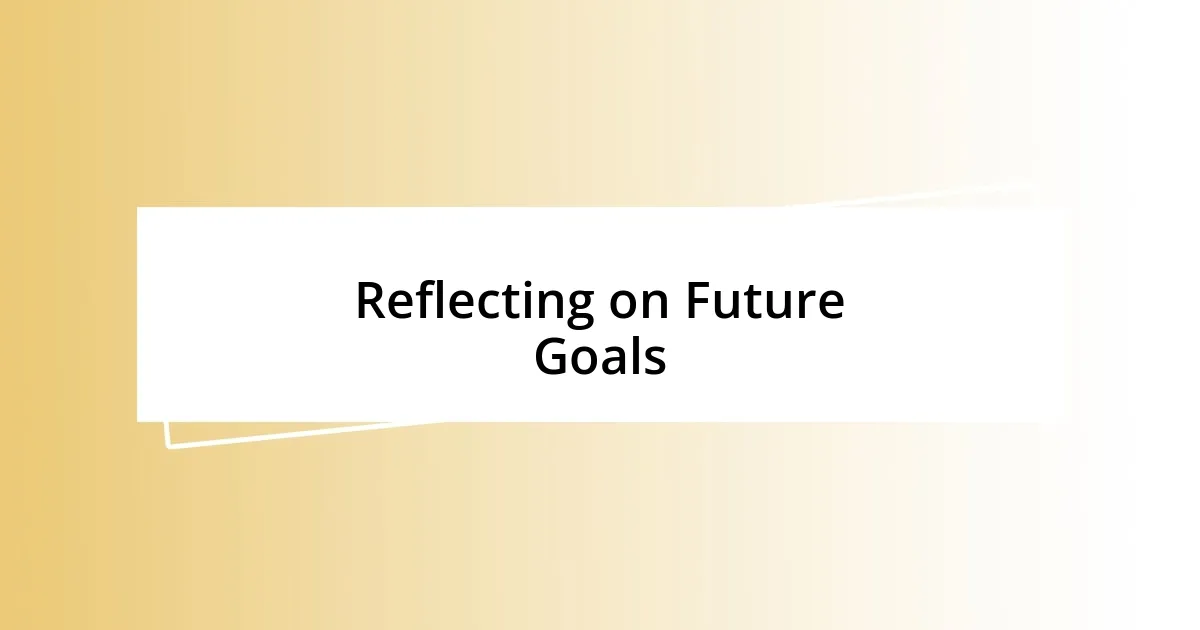
Reflecting on Future Goals
Reflecting on future goals is essential for growth. I remember a time when I sat down with a mentor after crossing a significant milestone. We discussed what lies ahead, focusing not just on achievements but on how I could build upon them. It was in that moment I realized that reflecting on my future goals creates a roadmap, making the journey feel purposeful rather than aimless. Have you thought about what specific goals you’re aiming for next?
One of the most enlightening experiences I’ve had was during a vision board workshop. I gathered with a group of friends, and we crafted our visions for the future. As we shared our dreams and aspirations, I felt a sense of clarity enveloping me. It was invigorating to pinpoint what I genuinely wanted to achieve. I discovered that visualizing our goals not only ignited passion but also brought accountability into the mix. Isn’t it fascinating how a simple act can empower us to own our aspirations?
Looking ahead, I’ve found that setting short-term goals allows me to stay focused. A few months ago, I committed to learning a new skill to enhance my capabilities as a speaker. Every week, I dedicated time to that pursuit, with each small success fueling my motivation. I’ve come to appreciate that these incremental steps create momentum towards larger achievements. What small steps can you take today that will set you up for future successes?












